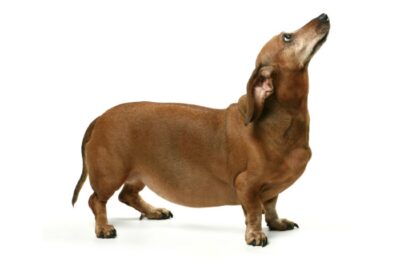Dachshunds, also known as “sausage dogs” or “wiener dogs,” are a small breed known for their elongated body shape and short legs. A critical aspect of owning a dachshund is understanding its weight. The healthy weight of Dachshund can vary depending on factors such as age, sex, and overall health. In this article, we will discuss the ideal weight range for dachshunds and how to keep them at a healthy weight.
Dachshunds, also known as “sausage dogs” or “weiner dogs,” are small dogs typically weighing between 16 and 32 pounds. However, their weight can vary depending on their sex, age, and overall health. Adult males tend to weigh on the heavier end of the spectrum, while females tend to be slightly lighter.
One unique aspect of a Dachshund’s weight is its proportionality to its body size. Dachshunds have a long, elongated body shape and short legs, which can make them appear heavier than they are.
Furthermore, their weight is distributed differently than other breeds, with a disproportionate amount of weight in the chest and abdomen area. This can make them more prone to specific health issues such as back problems, so monitoring their weight and ensuring they maintain a healthy weight throughout their life is essential.
Weight Of Dachshund

Dachshunds, also known as “sausage dogs” or “wiener dogs,” are a small breed known for their elongated body shape and short legs. The ideal weight range for a dachshund is between 16-32 pounds, depending on the size and sex of the dog.
These dogs can come in various coat types and colors and are a popular choice for many dog owners. A critical aspect of owning a dachshund is understanding its weight.
A healthy weight for a dachshund is crucial to ensure they can live a long and happy life. It’s a known fact that dachshunds are prone to obesity, leading to various health issues such as diabetes, joint problems, and cancer.
Therefore, owners must keep an eye on their Dachshund’s weight and ensure they are within the ideal weight range. One way to determine if your Dachshund is at a healthy weight is by feeling its ribs. A healthy dachshund should have a visible waist, and its ribs should be easily felt but not visible.
Additionally, you can consult with your veterinarian to determine your dog‘s ideal weight range and get guidance on achieving and maintaining a healthy weight for your Dachshund. With proper diet, regular exercise, and close monitoring, your Dachshund can live a long and healthy life.
What is the average weight of a Dachshund?
The average weight of a Dachshund can vary depending on the size and sex of the dog. Dachshunds come in two sizes: standard and miniature. Standard Dachshunds typically weigh between 16-32 pounds, while miniature Dachshunds usually weigh between 11-16 pounds.
Generally, male Dachshunds tend to be slightly heavier than female Dachshunds. However, it is essential to note that every dog is unique and may fall outside these average weight ranges.
You should determine the ideal weight for a dachshund by consulting a veterinarian and considering factors such as age, sex, and overall health. Maintaining a healthy weight is crucial for a Dachshund’s well-being and can help prevent health issues such as obesity, diabetes, and joint problems.
How much should a fully grown Dachshund weigh?

A fully grown Dachshund should weigh between 16-32 pounds, depending on the size and sex of the dog. Standard Dachshunds typically weigh between 16-32 pounds, while miniature Dachshunds usually weigh between 11-16 pounds.
However, it is essential to note that every dog is unique and may fall outside these average weight ranges. You should determine the ideal weight for a dachshund by consulting with a veterinarian and taking into account factors such as age, sex, and overall health.
Maintaining a healthy weight is crucial for a Dachshund’s well-being and can help prevent health issues such as obesity, diabetes, and joint problems.
Is my Dachshund overweight or underweight?
Determining if your Dachshund is overweight or underweight can be tricky, especially for new dog owners. One way to determine if your Dachshund is at a healthy weight is by feeling its ribs. A healthy Dachshund should have a visible waist, and its ribs should be easily felt but not visible.
Moreover, you can check if you can see their backbone and spine easily or not. If you can see them easily, your Dachshund may be underweighted, and if you can’t see them or if a thick layer of fat covers them, your Dachshund may be overweight.
Another way to check your Dachshund’s weight is to consult your veterinarian. They can help you determine your dog‘s ideal weight range and check for any underlying health issues contributing to weight problems.
Moreover, your veterinarian can guide how to achieve and maintain a healthy weight for your Dachshund. With proper diet, regular exercise, and close monitoring, your Dachshund can live a long and healthy life.
What is a healthy weight range for a Dachshund?

The healthy weight range for a Dachshund can vary depending on factors such as size, sex, and overall health. Standard Dachshunds should weigh between 16-32 pounds, while miniature Dachshunds should weigh between 11-16 pounds. However, it’s important to note that every dog is unique and may fall outside these average weight ranges.
A new owner can determine if their Dachshund is within a healthy weight range by feeling its ribs. A healthy Dachshund should have a visible waist, and its ribs should be easily felt but not visible.
Also, you can check if you can see their backbone and spine easily or not. If you can see them easily, your Dachshund may be underweight, and if you can’t see them or if a thick layer of fat covers them, your Dachshund may be overweight.
Can a Dachshund’s weight affect their health?
A Dachshund’s weight can significantly affect its health. Being overweight or obese can lead to various health issues, such as diabetes, joint problems, and even cancer. Overweight Dachshunds are also more prone to have respiratory issues and have a higher risk of developing IVDD (intervertebral disc disease), a common problem in dachshunds due to their elongated spine.
On the other hand, being underweight can also be problematic as it can lead to muscle loss and a weaker immune system, making the dog more susceptible to various health issues. A healthy weight for a Dachshund is crucial for their overall well-being and can help ensure they live a long and happy life.
It’s vital for Dachshund owners to monitor their dog‘s weight and make sure they are within a healthy weight range by following a proper diet and exercise plan and consulting with a veterinarian.
How do I know if my Dachshund is at a healthy weight?

Determining if your Dachshund is at a healthy weight can be tricky, but there are a few ways to check. One way to determine if your Dachshund is at a healthy weight is by feeling its ribs. A healthy Dachshund should have a visible waist, and its ribs should be easily felt but not visible.
Furthermore, you can check if you can see their backbone and spine easily or not. If you can see them easily, your Dachshund may be underweight, and if you can’t see them or if a thick layer of fat covers them, your Dachshund may be overweight.
What factors can affect a Dachshund’s weight?
Several factors can affect a Dachshund’s weight, including diet, exercise, age, health conditions, medications, neutering or spaying, and genetics. The diet of a Dachshund plays a significant role in its weight. Feeding them too much or too little or the wrong types of food can lead to weight gain or loss.
Regular exercise is also vital for maintaining a healthy weight, Dachshunds that don’t get enough exercise may become overweight, while those that get too much may become underweight.
As Dachshunds age, their metabolism may slow down and become less active, both of which can contribute to weight gain. Certain health conditions, such as hypothyroidism and Cushing’s disease, can also affect a Dachshund’s metabolism and lead to weight gain. Some medications, such as steroids, can cause weight gain as a side effect.
Finally, neutering and spaying can affect a dog‘s metabolism and activity levels, leading to weight gain. Some Dachshunds may have a genetic predisposition to gain weight quickly or to have a slower metabolism.
It’s pertinent to remember that every dog is unique, and their weight may be affected by a combination of these factors. By monitoring your Dachshund’s weight, consulting with a veterinarian, and making adjustments to their diet and exercise plan, you can help ensure that your Dachshund maintains a healthy weight throughout their life.
How can I help my Dachshund reach a healthy weight?

You can take several steps to help your Dachshund reach and maintain a healthy weight.
Consult with your veterinarian: Your veterinarian can help you determine your Dachshund’s ideal weight range and check for any underlying health issues contributing to weight problems. Additionally, your veterinarian can guide how to achieve and maintain a healthy weight for your Dachshund.
Create a diet plan: It is essential to feed your Dachshund dog the right amount of high-quality food that meets its nutritional needs. Your veterinarian can help you create a diet plan tailored to your Dachshund’s specific needs.
Increase exercise: Regular exercise is vital for maintaining a healthy weight. You can help your Dachshund reach a healthy weight by increasing their exercise. This can include regular walks, runs, or playtime.
Monitor weight: Regularly monitoring your Dachshund’s significance can help you determine if they are reaching a healthy weight and if any adjustments need to be made to their diet or exercise routine.
Avoid table scraps: It’s essential to avoid giving your Dachshund table scraps and high-calorie treats, as it can lead to weight gain.
Be consistent: Consistency is vital to help your Dachshund reach a healthy weight. It’s essential to stick to a consistent diet and exercise plan and to make any necessary adjustments as advised by your veterinarian.
What is the ideal weight for a Dachshund according to breed standards?
According to breed standards, the ideal weight for a Dachshund can vary depending on the size and sex of the dog. Standard Dachshunds should weigh between 16-32 pounds, while miniature Dachshunds should weigh between 11-16 pounds.
These are the ideal weights according to the American Kennel Club (AKC) and the Fédération Cynologique Internationale (FCI), which are the leading organizations that set the breed standards for Dachshunds. However, it’s important to note that every dog is unique and may fall outside these average weight ranges.
Can a Dachshund’s weight vary depending on their age and sex?

A Dachshund’s weight can vary depending on their age and sex. Adult males typically weigh between 16 and 32 pounds, while adult females usually weigh between 16 and 28 pounds. This is the typical weight range for adult Dachshunds.
However, it’s important to note that dogs may fall outside these ranges due to genetics, diet, and exercise.
Puppies will weigh less than adult dogs as they are still growing and developing. The weight of a Dachshund puppy will increase as they age and reach maturity. As Dachshunds age, they can lose muscle mass and weight, which is a normal part of aging.
Does the weight of a Dachshund vary according to their size variation?
The weight of a Dachshund can vary depending on their size variation. Dachshunds come in three sizes: standard, miniature, and kitchen (rabbit). Standard Dachshunds are the largest of the three and can weigh between 16 and 32 pounds. Miniature Dachshunds are smaller and typically weigh between 11 and 16 pounds. Kaninchen Dachshunds are the smallest and usually weigh less than 11 pounds.
It’s worth noting that the weight range for each size variation can overlap, some standard dachshunds can weigh less than 11 pounds, and some miniature Dachshunds can weigh more than 16 pounds.
Conclusion
In conclusion, the weight of Dachshund can vary depending on several factors, including age, sex, and size variation. Adult males typically weigh between 16 and 32 pounds, while adult females usually weigh between 16 and 28 pounds.
However, it’s important to note that dogs may fall outside these ranges due to genetics, diet, and exercise. Dachshunds come in three size variations: standard, miniature, and a kitchen (rabbit), and each size variation will have a different weight range.
Keep in mind that the weight of a Dachshund should be proportionate to the size of the dog, and one should consult a veterinarian if there is a significant deviation from the expected weight for the specific size variation.
Keeping a healthy weight for your Dachshund is vital for their overall health, as obesity can lead to several health problems, such as joint problems and respiratory issues. By monitoring your Dachshund’s weight and consulting with your vet, you can help ensure your dog stays healthy and happy throughout life.


